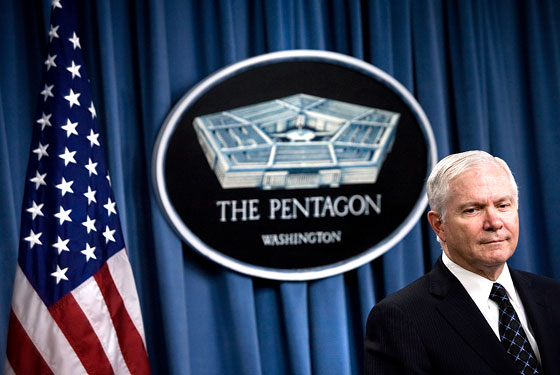In an excerpt published in the Wall Street Journal, former Secretary of Defense Robert Gates’ new book Duty: Memoirs of a Secretary at War reveal a man whose Pentagon experience has soured him on many of America’s foreign policy decisions and those who make them.
Videos By Rare
Gates writes, “Wars are a lot easier to get into than out of” lamenting that “Those who ask about exit strategies or question what will happen if assumptions prove wrong are rarely welcome at the conference table when the fire-breathers are demanding that we strike – as they did when advocating invading Iraq, intervening in Libya and Syria, or bombing Iran’s nuclear sites.”
Serving under both Barack Obama and George W. Bush, Gates believes presidents have been too eager to go to war, “in recent decades, presidents confronted with tough problems abroad have too often been too quick to reach for a gun. Our foreign and national security policy has become too militarized, the use of force too easy for presidents.”
Gates’ concerns about executive overreach mirror recent debates in Congress over limits on the president’s ability to commit US forces abroad. Libertarian Republicans such as Senator Rand Paul (R-KY) have introduced amendments demanding the President seek congressional approval before going to war, citing Article I, Section 8, Clause 11 of the U.S. Constitution, which grants only Congress the power to declare war. Hawkish Republicans like Senator John McCain have insisted congressional authority isn’t necessary. McCain, a staunch supporter of US intervention in Libya in 2011 and getting involved in Syria’s civil war last year, has criticized Gates’ book, saying it “undermines the ability to conduct foreign policy.”
Gates believes hawkish ideologues in both parties play too great a role in American foreign policy decisions, “Today, too many ideologues call for U.S. force as the first option rather than a last resort. On the left, we hear about the ‘responsibility to protect’ civilians to justify military intervention in Libya, Syria, Sudan and elsewhere. On the right, the failure to strike Syria or Iran is deemed an abdication of U.S. leadership.”
The former defense secretary worries that ideologues’ eagerness for war tarnishes America’s global image, “so the rest of the world sees the U.S. as a militaristic country quick to launch planes, cruise missiles and drones deep into sovereign countries or ungoverned spaces.” Gates also calls for more restraint in our foreign policy, writing, “There are limits to what even the strongest and greatest nation on Earth can do – and not every outrage, act of aggression, oppression or crisis should elicit a U.S. military response.”
Gates compares the eagerness of Washington officials to get involved in war with how modern warfare is conducted, “This (eagerness) is particularly worth remembering as technology changes the face of war. A button is pushed in Nevada, and seconds later a pickup truck explodes in Mosul. A bomb destroys the targeted house on the right and leaves the one on the left intact.”
Has war become too abstract or distant for everyone involved? Gates asks, “For too many people – including defense ‘experts,’ members of Congress, executive branch officials and ordinary citizens – war has become a kind of videogame or action movie: bloodless, painless and odorless.”
Gates concludes, “my years at the Pentagon left me even more skeptical of systems analysis, computer models, game theories or doctrines that suggest that war is anything other than tragic, inefficient and uncertain.”
In 1946, General Dwight D. Eisenhower made a similar statement when his experience on the battlefield led him to declare, “I hate war as only a soldier who has lived it can, only as one who has seen its brutality, its futility, its stupidity.”

